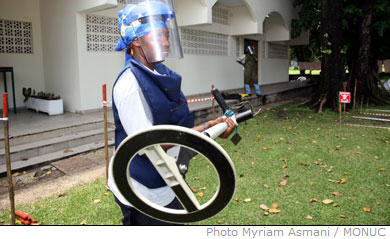 World Mine Action day was celebrated in Kinshasa on Wednesday April 4 2007. Many speakers explained the dangers that anti personnel mines and unexploded ordnance (UXO) pose to the Congolese population and the development of the country, as well as underlining the challenges that lie ahead in this fight in the DRC.
World Mine Action day was celebrated in Kinshasa on Wednesday April 4 2007. Many speakers explained the dangers that anti personnel mines and unexploded ordnance (UXO) pose to the Congolese population and the development of the country, as well as underlining the challenges that lie ahead in this fight in the DRC.
Landmines and UXO remain in the ground and continue to maim and kill indiscriminately, many years after armed conflict, and DRC is one of 84 affected countries worldwide, claiming some 20,000 victims each year.
The assistance given to the DRC government by donors such as Holland and others, as well as by MONUC, UN agencies and international and national NGO’s is essential in this fight, and focuses on three main areas - de-mining, sensibilisation of the dangers of landmines and assistance to victims.
De-mining in the DRC - carried out by Mechem, MAG and others - is extremely expensive and time consuming work, particularly as infrastructure is nonexistent and transport extremely difficult in many parts of the country.
Sensibilisation and assistance to victims forms part of the important work of organizations such as the Red Cross and Handicap International are involved in.
Mr. Max Hadorn of the International Red Cross said two important issues need to be addressed in the fight against landmines in the DRC.
“Firstly, the government needs to have national legislation on this matter, and assistance to victims is insufficient, I hope this event will keep the focus on this problem that affects thousands of Congolese,” he said.
The Red Cross runs five centres of assistance to victims of mines in the DRC- two in Kinshasa, as well as Goma Bukavu and Mbuji Mai.
Mr. Andre Dellevoet of the Dutch embassy, who are one of the main donors in the fight against mines in the DRC, said that mines and UXO continue to kill and maim indiscriminately.
“The fight against landmines is a moral imperative and not a luxury. A lot has been realised, but more needs to be done to enhance the capacity of the Congolese government to fight and eradicate mines in the country.”
Mr. Ross Mountain, UN Deputy Special Representative to the Secretary General in the DRC, said that as a signatory to the Ottawa treaty in 2002, the DRC government has a responsibility in the fight.
“MONUC has been instrumental in helping them to reinforce their national capacity in terms of sensibilisation, assistance to victims and demining. It is essential that the government continue this important work, which affects the future socio economic development of the country.”
Following the Kinshasa conflict of March 22 to 24 last, over 20 UXO’s were found in the city, particularly in the central Gombe district, and Mechem and others are still evaluating and tackling this problem in the capital.
Related articles
- • Thousands of Women March Against M23 Rebels in Kinshasa (November 24, 2012)
- • Tshisekedi Says He Won, Can He Prove It? (December 17, 2011)
- • Security Council extends mandate of UN mission in DR Congo (June 28, 2011)
- • Rights Groups: Strengthen Civilian Protection Before Elections (June 9, 2011)
- • UN Sanctions FDLR Leaders, CNDP Rebel Commander Integrated into Army (December 2, 2010)
- • UN launches patrols to head off rebel violence during holiday season (December 1, 2010)
- • Congo Defense Minister Rejects UN Allegations against Army (October 17, 2010)
- • Rebel leader presumed responsible for mass rape arrested (October 5, 2010)
- • UN DR Congo Report Exposes Grave Crimes (October 1, 2010)
- • UN says peacekeepers 'failed' DR Congo rape victims (September 7, 2010)
- • UN Defends Inaction on Mass Rapes in Eastern Congo, Government Missing in Action (August 26, 2010)
- • Two Suspects Arrested in Attack on MONUSCO Base (August 20, 2010)
- • Ban Ki-moon deplores deadly attack against blue helmets in North Kivu (August 18, 2010)
- • Ban Ki-moon inaugurates new phase of UN mission in DR Congo (July 1, 2010)
- • Congo Celebrates 50th Anniversary of Independence (June 30, 2010)
- • Top UN envoy bids farewell to first batch of blue helmets leaving DR Congo (June 16, 2010)
- • Veteran United States diplomat appointed to top UN post in DR Congo (June 9, 2010)
- • Top UN officials urge inquiry into killing of Congolese human rights activist (June 3, 2010)
- • UN to reduce DR Congo peace force (May 28, 2010)
- • Security Council agrees to convert UN mission in DR Congo into stabilization force (May 28, 2010)
- • U.S. Official Sees Improvement in Africa's Great Lakes Region (May 26, 2010)
- • Back from DR Congo, Security Council set to review mandate of UN force (May 17, 2010)
- • Security Council members depart for two-day visit to DR Congo (May 13, 2010)
- • UN chief warns against early withdrawal from DR Congo (April 30, 2010)
- • U.N. Security Council Cancels Congo Trip (April 16, 2010)
- • DR Congo army regains control of Mbandaka (April 4, 2010)
- • Enyele rebels enter major city in Equateur province (April 4, 2010)
- • Behind Human Rights Watch Report on LRA, a Plea for MONUC to Remain in the Congo (March 29, 2010)
- • New strategy needed against LRA in DR Congo, says UN chief (March 28, 2010)
- • UN mission in DR Congo vows continued support for army (March 24, 2010)
Tags: | • MONUC |







